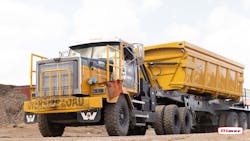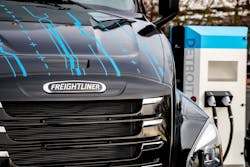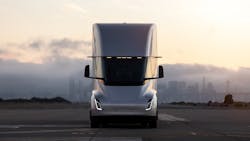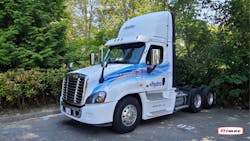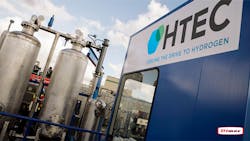Trimac is answering the call for more sustainable transportation solutions.
The Canada-based bulk hauler now is actively involved in seven programs and initiatives aimed at transitioning its entire truck fleet to electric and/or fuel cell vehicles that exceed the demands of the transportation industry.
The company’s sustainability goals include a “substantial” investment in the modernization of its transport fleet, hoping to usher in “a new era of sustainable transportation.” Trimac reports conducting extensive green-energy research, and collaborating with government consortiums and third-party alternative fuel programs to identify, test, and analyze the long-term viability of alternative transportation solutions.
“Trimac’s commitment to sustainability and environmental responsibility is evident in its initiatives to transform its current fleet,” the company said in a news release.
“By investing in electric and fuel cell vehicles, collaborating with government consortiums and third-party organizations, investing in research and development, and conducting pilot programs, Trimac hopes to lead the industry in the promotion and implementation of sustainable transportation solutions.”
The following is a breakdown of Trimac’s current zero-emission initiatives.
Azetec
Trimac is a partner in the Zero Emissions Truck Electrification Collaboration (AZETEC) project led by the Alberta Motor Transport Association. The project aims to develop and test a 435-mile-range, zero-emissions truck capable of the same demands as traditional combustion engine vehicles. Testing was expected to begin this month, Trimac said.
MedaTech
Trimac is partnering with MedaTech to test a fully electric, on-highway transport truck to haul copper concentrate from Teck Resources’s Highland Valley Copper Operations in south central British Columbia to Ashcroft, British Columbia, Canada. The battery-electric drive system is expected to work more efficiently than a comparable diesel engine, outputting approximately 830 hp and nearly double the amount of torque.
Freightliner E-Cascadia
Trimac is currently investigating a potential application for the Freightliner E-Cascadia, a fully electric version of its company fleet truck. It features an estimated 217-mile range and has a gross combination weight (GCW) of 82,000 lb.
Tesla Semi
In 2017, Trimac placed five reservations for the Tesla semi, billed as the “most powerful and fuel-efficient electric semi ever made.” The Tesla semi has an estimated 497-mile range, an 82,000-lb. GCW and can charge its battery up to 70% in 30 minutes.
Hydra Energy Corporation
Earlier this year, Trimac began working with Hydra Energy to retrofit one of its fleet trucks with Hydra’s intake manifold hydrogen injection system, which is expected to reduce greenhouse gas (GHG) emissions by approximately 40%, with the goal of transitioning to a 100% reduction in the future. The unit was delivered for testing in July.
Innovative Fuel Systems
In 2022, Trimac began collaborating with Innovative Fuel Systems (IFS) to support the advancement of hydrogen fuel use in 90% of heavy-duty truck engines using IFS’s retrofitted Multi-Fuel Technology platform. According to IFS, their platform is designed to be the fastest and most economically efficient pathway to hydrogen fuel use within the transportation industry and Trimac is currently testing these capabilities.
HTEC H200 Gateway Program
The HTEC H200 Gateway Program is an initiative to deploy hydrogen fuel supply infrastructure and heavy-duty fuel cell trucks in British Columbia and Quebec. The project involves the deployment of 200 heavy-duty hydrogen fuel cell vehicles, 16 hydrogen fueling stations, and two large-scale by-product hydrogen liquefaction systems.


